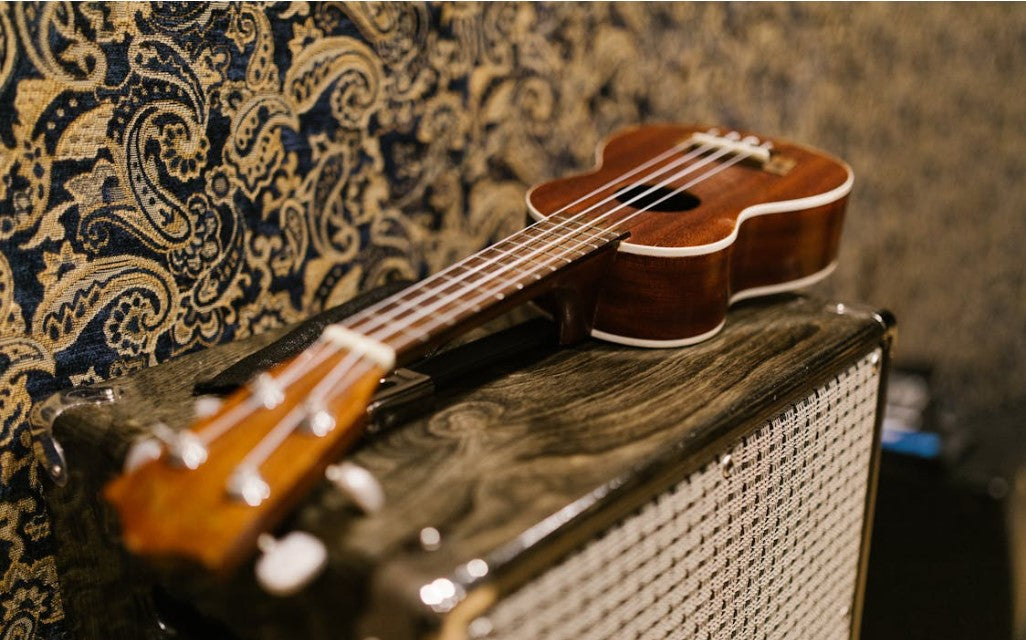How to Store Your Ukulele in a Dry Climate: Essential Tips for Longevity and Sound Quality

So, you've got your ukulele and you're loving playing your favourite tunes. But now you're wondering...
"How do I store my ukulele in a dry climate?"
Storing your ukulele properly is crucial to maintaining its sound quality and longevity, especially in a dry climate.
Ukuleles are delicate instruments made of wood, which can be severely affected by changes in humidity. To help you look after your prized uke and protect it from the harsh effects of dry air, we’ve rounded up some ripper tips and best practices.
Understanding the Impact of Dry Climates on Ukuleles
Dry climates present a unique set of challenges for ukulele owners. The lack of moisture in the air can have several detrimental effects on the wooden components of your instrument. Here's a closer look at how a dry climate can impact your ukulele:
Cracking
Wood is a hygroscopic material, meaning it absorbs and releases moisture based on the surrounding environment. In a dry climate, the air's low humidity levels cause the wood to lose moisture.

As the wood dries out, it can shrink, leading to cracks, particularly around the joints and seams where different pieces of wood are glued together. Cracking not only affects the appearance of your ukulele but can also compromise its structural integrity, making it more vulnerable to further damage.
Warping
Warping occurs when the wood of your ukulele bends or twists out of shape due to uneven moisture levels. In a dry climate, the neck and body of the ukulele can warp as the wood dries out unevenly. This can lead to significant issues with the instrument's playability.
A warped neck can cause problems with string action, making it difficult to press the strings down and affecting the overall feel of the instrument. Additionally, a warped body can disrupt the alignment of the ukulele, resulting in tuning issues and a less stable instrument.
Decreased Sound Quality
The sound quality of a ukulele is highly dependent on the condition of its wood. Dry wood loses its flexibility and resonance, leading to a change in the instrument's tonal quality. The ukulele may produce a dull, flat sound as opposed to the rich, vibrant tones it should ideally create.
The lack of moisture can also reduce the sustain of the notes, making your ukulele sound less lively and more muted.
Maintaining the right humidity levels is crucial for preserving the sound quality and ensuring your ukulele continues to produce beautiful music.
Essential Tips for Storing Your Ukulele in a Dry Climate
Properly storing your ukulele in a dry climate is crucial to maintaining its quality and longevity. Here are some detailed tips to help you protect your instrument from the adverse effects of low humidity.
1. Use a Ukulele Case
One of the most important steps you can take to protect your ukulele is to store it in a high-quality case whenever you're not playing it. A case offers a dual layer of protection: it shields the instrument from physical damage such as knocks, drops, and scratches, and it helps create a controlled environment that buffers against rapid changes in humidity.
Hard Cases: These provide the best protection against physical damage. They are typically made of sturdy materials like wood or fiberglass and are lined with soft padding to cushion the ukulele. Hard cases also seal better, offering superior humidity control.

Padded Gig Bags: While not as robust as hard cases, padded gig bags are a good alternative, especially if you need a lighter, more portable option. Look for gig bags with thick padding and a snug fit to ensure your ukulele is adequately protected.
2. Invest in a Humidifier
In dry climates, a humidifier is essential for maintaining the proper moisture level inside your ukulele case. Humidifiers help prevent the wood from drying out, which can lead to cracking, warping, and degraded sound quality. There are different types of humidifiers to consider:
Soundhole Humidifiers: These are designed to be placed directly inside the soundhole of the ukulele. They release moisture slowly, maintaining a stable humidity level around the most sensitive parts of the instrument. Soundhole humidifiers are effective and easy to use, making them a popular choice among ukulele players.
Case Humidifiers: These are placed inside the ukulele case and work by releasing moisture into the enclosed space. They are particularly useful if you have a hard case that seals well, as they can maintain a consistent humidity level throughout the entire case. Some case humidifiers come with built-in hygrometers, allowing you to monitor and adjust the humidity as needed.

Using a humidifier requires regular maintenance. Check and refill the humidifier as needed to ensure it remains effective. A well-maintained humidifier can significantly extend the life of your ukulele and preserve its sound quality.
Take Good Care of Your Ukulele
Protecting your ukulele from the effects of a dry climate is essential for preserving its sound quality and structural integrity. By using a quality case, investing in a good humidifier, and monitoring the humidity levels, you can ensure your ukulele stays in top condition for years to come.
Ready to protect your ukulele? Check out our top-rated humidifier and durable ukulele cases in our shop today! Keep your instrument safe and sound, no matter the climate.
By following these tips and investing in the right accessories, you can enjoy playing your ukulele without worrying about the damaging effects of dry air. Happy strumming!
 Lifetime Warranty
Lifetime Warranty  60 Day Returns Policy
60 Day Returns Policy 1-2 Day Delivery
1-2 Day Delivery 
































Leave a comment